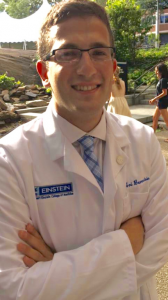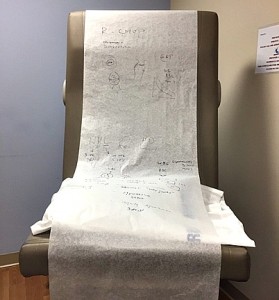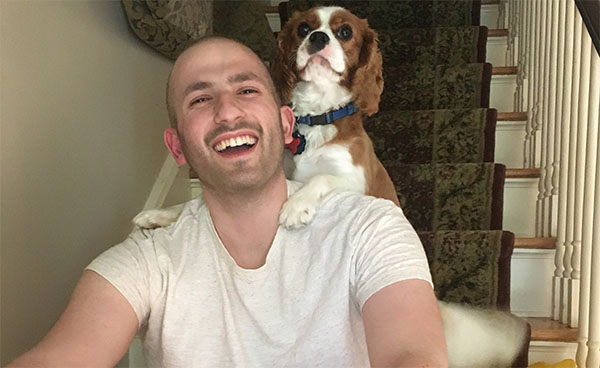 I began medical school, like many of my peers, with some experience working with patients. I worked as a volunteer EMT with Cornell University EMS for four years during my undergraduate years; shadowed a cardiologist and an anesthesiologist through Cornell’s Urban Summer program at NYP Hospital – Cornell and worked with patients during Global Medical Brigade trips to rural Honduras. All of this sparked my interest in medicine, but to claim I had any real understanding of a patient’s existential journey through serious disease would be an overstatement.
I began medical school, like many of my peers, with some experience working with patients. I worked as a volunteer EMT with Cornell University EMS for four years during my undergraduate years; shadowed a cardiologist and an anesthesiologist through Cornell’s Urban Summer program at NYP Hospital – Cornell and worked with patients during Global Medical Brigade trips to rural Honduras. All of this sparked my interest in medicine, but to claim I had any real understanding of a patient’s existential journey through serious disease would be an overstatement.
That changed abruptly at the start of my first year at Albert Einstein College of Medicine, when, after all the years of hard work to begin my dream of becoming a physician, I was blindsided by an unimaginable role reversal.
Halfway through my clinical anatomy course, as I was learning the beautifully complex organization of the human body, I noticed a small lump at the base of my neck. Fast-forward two weeks: There was a series of doctor visits, scans, discrepancies in the diagnosis, nail-biting waits for biopsies and even a scheduled―then cancelled―major surgery. Finally, I received the conclusive biopsy result. The diagnosis: primary mediastinal B-cell lymphoma.
And just like that, I was a cancer patient.
Action and Attitude
At first the fear was crippling and the emotions ran deep. Hearing the word “cancer” outside the classroom, and in association with my body, was unbelievably difficult. In all the training leading to medical school, I had failed to prepare for becoming a patient myself.
I jumped into action mode. I had to, knowing all too well that aggressive disease is often time sensitive. More importantly, I recognized that attitude can play an enormous role in healing. I would need chemotherapy and a fighting spirit. My life became my classroom and I was more motivated than ever to learn and to conquer my disease.
Finding Concern and Care
The choice of a care facility is one of the most important decisions a patient can make. My family and I discussed at length whether or not I should undergo my treatment at Montefiore, the hospital network of Einstein. This was the obvious choice, because my number-one goal was to continue with med school throughout chemo.
At Montefiore I learned the difference physicians, nurses and care teams can make throughout the patient’s journey. Sometimes, a bit of compassion and time are all that’s needed to cross the thin line between crippling fear and uplifting hope. Physicians hold that power in every interaction, balancing humanity and warmth with medicine and science.
That’s why I have to offer a heartfelt shout-out to my primary oncologist, Dr. Noah Kornblum. He exemplifies everything that I will strive to be for my future patients. His passion for science and his humanistic and personal touch in one of the most emotionally difficult fields of patient care provided more comfort to my family and me than anything else throughout this otherwise terrible and anxiety-ridden journey.
Dr. Kornblum treated me the way I asked to be treated: as a medical student first, but also as an anxious patient worrying about the precarious life ahead of me. I’ll never forget our first meeting, where he got me up off my chair so he could use the paper covering it to draw out every detail of my lymphoma’s pathophysiology. We developed a unique patient-doctor bond, sharing stories of our favorite anatomy mnemonics for memorizing the cranial nerves, and joking about crossing paths the following year in my hematology course.

The chair with Dr. Kornblum’s diagram
His team also supported me. Dr. Kornblum’s nurse, Karen, deserves a shout-out all her own, as do the nurses at the infusion center (Anne, Inga, Betty, Michelle and their colleagues). They were all a true gift to my family. If this team is representative of the type of providers that Einstein/Montefiore employs, then I am the proudest member of this special community, as it has consistently treated me as “family.”
The Path Ahead
Now, on the other side of five grueling months of chemotherapy, I am in a great place. My post-chemo PET scans showed no trace of disease: complete remission—the most positive outcome. My unspeakable fear has been replaced by unshakable positivity. I achieved a major goal, having successfully finished my first year of medical school while learning more than any medical student should ever have to learn about disease. I’ll always remember the fear that defined the early part of this journey, and that surfaced again in the almost paralyzing “scanxiety” just before my last PET. I’ll also remember that my doctors and care team carried me through. If I become the physician I dream of being, you can bet I will pay their lessons forward, ensuring that every patient receives the same compassionate care that has lifted me up.

Right after getting the phone call from the doctor that my PET scan was clean!


Comments on this entry are closed.
I have lymphoma it went into remission for 2years and now it’s back I’m doing chemo again they want to do a stem cell implant is that a good thing I hope but I’m not sure please give me some feedback